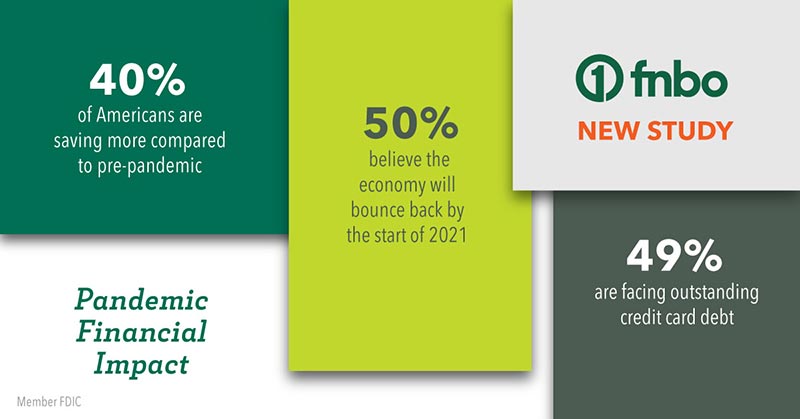FDIC-Insured - Backed by the full faith and credit of the U.S. Government
-
-
-
FNBO Newsroom
Date Published: September 16, 2020
-

Press Release
Release Date: September 16, 2020
Study: In Face of Pandemic Challenges, 72 Percent of Americans Becoming More Organized with Finances
—Pandemic Financial Impact Survey Data Released by First National Bank of Omaha—
PLUS: 40% Are Saving More than Before the Pandemic
OMAHA, Neb. September 16, 2020—First National Bank of Omaha (FNBO) today released the results of its ‘Pandemic Financial Impact Survey,’ which examined the effects of COVID-19 on Americans’ financial habits and priorities, covering topics from saving, spending, financial outlooks, and planning for the future.
According to the survey, 72% of people say COVID-19 has caused them to become more organized when it comes to their finances, and while 40% of Americans are saving more compared to pre-pandemic, 55% report living paycheck to paycheck. By comparison, the previous FNBO Financial Planning Survey earlier this spring found that 49% of Americans were living paycheck to paycheck.
When asked about outstanding debt, 49% report they have credit card debt, 30% report homeownership debt, and 24% report student loan debt.
“It’s no surprise that Americans have been facing financial hardships brought on by this unprecedented event. Even amidst these new challenges, it’s reassuring to see that so many have made the effort to become more financially organized, a great first step in helping to plan for the future and prioritize paying off debt,” said Sean Baker, executive vice president, Individual Customer Segment, FNBO. “We encourage consumers to remain positive as they work towards their financial goals, and to continue seeking out resources to help them achieve financial wellbeing.”
Among the survey’s additional findings on respondents’ financial habits and priorities:
- SHOPPING LOCAL & CHARITABLE GIVING: Since May, 38% of respondents say they have consciously purchased from a minority-owned business and only 29% have reduced their philanthropic giving. Shopping local has become a preference, as 67% of respondents report they have made a conscious effort to shop from locally-owned businesses.
- FINANCIAL STANDING: 38% of Americans don’t have an emergency fund in place and 20% have one that would only cover up to one month of expenses. Additionally, 32% of respondents say the financial impact of the pandemic has caused them to miss a payment.
- PLANNING FOR THE FUTURE: 54% of respondents report that the pandemic has negatively impacted their ability to save for retirement. When asked about their financial priority for the remainder of 2020, 35% say paying off debt, 31% say increasing their savings, 14% say increasing their emergency fund, 6% say retirement savings, and only 5% say investing in the stock market.
- ECONOMIC OUTLOOK: 50% of respondents believe the economy will bounce back by the start of 2021.
This is the latest survey in the Personal Finance and Consumer Spending Survey Series from FNBO. Previously, the bank released its Coronavirus Impact Survey in April.
METHODOLOGY
This survey was conducted online using Survey Monkey among a national sample of 1,075 adults spanning across U.S. geographic regions and income levels. The survey sample was weighted to reflect the gender distribution and the age distribution across the 18-44 and 45+ age brackets in U.S. census data.
The articles in this blog are for informational purposes only and not intended to provide specific advice or recommendations. When making decisions about your financial situation, consult a financial professional for advice. Articles are not regularly updated, and information may become outdated.
